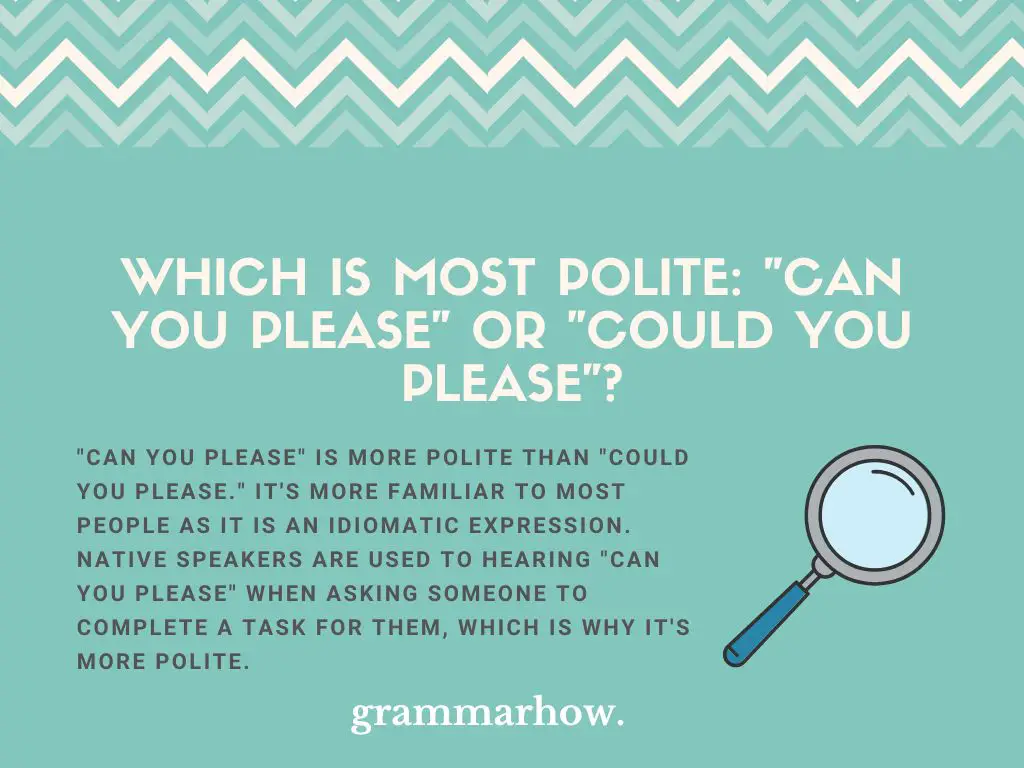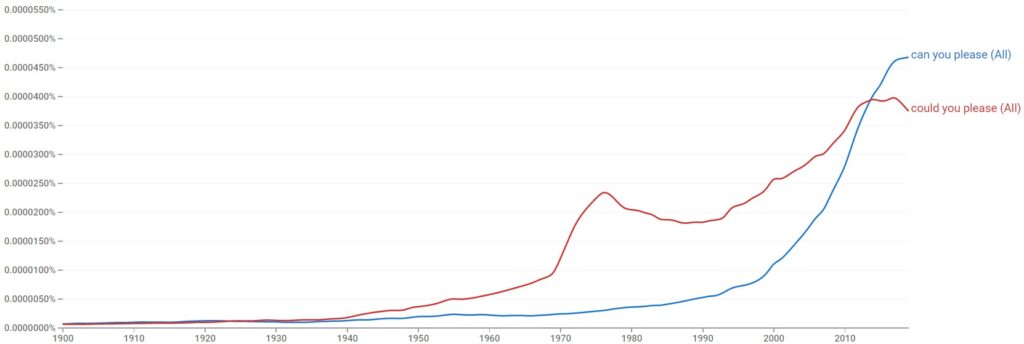It’s important you know how to phrase questions when it comes to being polite. Using the phrases “can you please” and “could you please” are very similar forms when trying to retain politeness. This article will explain all the things you have to look out for.
Which is Most Polite: “Can You Please” or “Could You Please”?
“Can you please” is more polite than “could you please.” It’s more familiar to most people as it is an idiomatic expression. Native speakers are used to hearing “can you please” when asking someone to complete a task for them, which is why it’s more polite.

Interestingly, “can you please” technically means that we’re asking someone whether they are able to do something for us. As in, we’re asking whether they have the required skills to help us out.
“Can” (and “could”) mean “are able to,” so we use them to ask whether someone can help us do something.
Some people prefer not to use “could you please” because it makes it sound like we’re asking them to complete something under specific circumstances. Some people avoid this because it can take for granted what someone is (or isn’t) able to do.
Can You Please
Let’s start with learning how to use “can you please” in a sentence. It would help to know that “can” is the equivalent of “are you able to.” It’s a good question starter that allows us to ask whether someone is capable of completing a request we might have.
“Can” is a verb form. When used with most pronouns, it is the present tense. We could use it like this:
- I can help you.
It shows that we are able to take the time to do something because we know the best way to complete it. In this case, we “can” help someone because we have the required things that they’re looking for.
We could also swap it around to turn it into the question form:
- Can you help me?
This is a great question if you simply want to ask whether someone has the capacity to help you at this very moment. However, it’s not all that polite just yet.
That’s where “please” comes in. We add it to the end of the “can you” phrase to make sure we’re being as polite as possible. It shows people that we’re asking for their help but that we also completely understand if they can’t offer it.
- Can you please help me? I need to know whether you’ve understood this question better than I.
- Can you please let me know what you think? I feel like I can trust your opinion the best.
- Can you please tell me if there’s anything else I need to change? I don’t want to get this wrong.
- Can you please find it in your heart to forgive her? She clearly didn’t mean anything by what she said!
- Can you please shut up! I’m sick of hearing your voice! I don’t need to listen to you anymore.
Could You Please
Knowing how to use “could you please” in a sentence is fairly standard once you’ve understood “can you please.” It works best when we’re looking to find out whether someone can help us under the current circumstances.
Some people think “could you please” is a bit pushier. It already assumes that someone is able to help; we simply use “could” to find out whether they’re going to help or not.
“Could” as a verb works best in the past tense. You might use it like this:
- I could have helped you.
However, when we use it as a question, it is no longer the past tense. Instead, it becomes a present tense question to find out whether someone can fulfill our request:
- Could you help me?
And again, it makes sense to add “please” if you want to be as polite as possible.
- Could you please help me? I feel like I’ve asked you already, though.
- Could you please find a way to get this sorted for me?
- Could you please let me know if there’s anything else I can do? I don’t want to have to suffer from this.
- Could you please stop doing that right now! I don’t think you realize how annoying it is.
- Could you please behave yourself for once in your life! It’s about time you learned!
Are “Can You Please” and “Could You Please” Rude?
“Can you please” and “could you please” are not rude. We use them as polite questions. Including “please” is a great way to show how polite they are. Without “please,” both phrases might be perceived as ruder because they are not making polite requests for someone.
These questions are polite:
- Can you please help me out with this?
- Could you please give me a hand?
While these can be rude, depending on the context:
- Can you help me?
- Could you stop?
Is “Can You Please” or “Could You Please” Used The Most?
It should help to take a look at some statistics to find out which of the two phrases is more popular. That way, you’ll have a better understanding of which one you’ll come across.
According to Google Ngram Viewer, “can you please” is the most popular of the two questions. That’s because it’s idiomatic and it’s much more familiar to native speakers.

“Can you” as a verb just appears in more situations. It applies to many contexts that people are used to, so it makes sense that it’s the more popular phrase of the two.
Also, it just so happens to be the more polite choice, which is likely why people are keen on using it.
With all that said, “could you please” is still quite popular. It sees plenty of common uses; it’s just not the same as “can you please.”
“Can You Please” and “Could You Please” – Synonyms
Finally, let’s go over some similar words or phrases that might help you if you don’t want to use these two options:
- Would you please
- Do you mind
- Could you perhaps
- If you could
You may also like:
“Would You” vs. “Could You”: Difference Explained (Examples)

Martin holds a Master’s degree in Finance and International Business. He has six years of experience in professional communication with clients, executives, and colleagues. Furthermore, he has teaching experience from Aarhus University. Martin has been featured as an expert in communication and teaching on Forbes and Shopify. Read more about Martin here.
